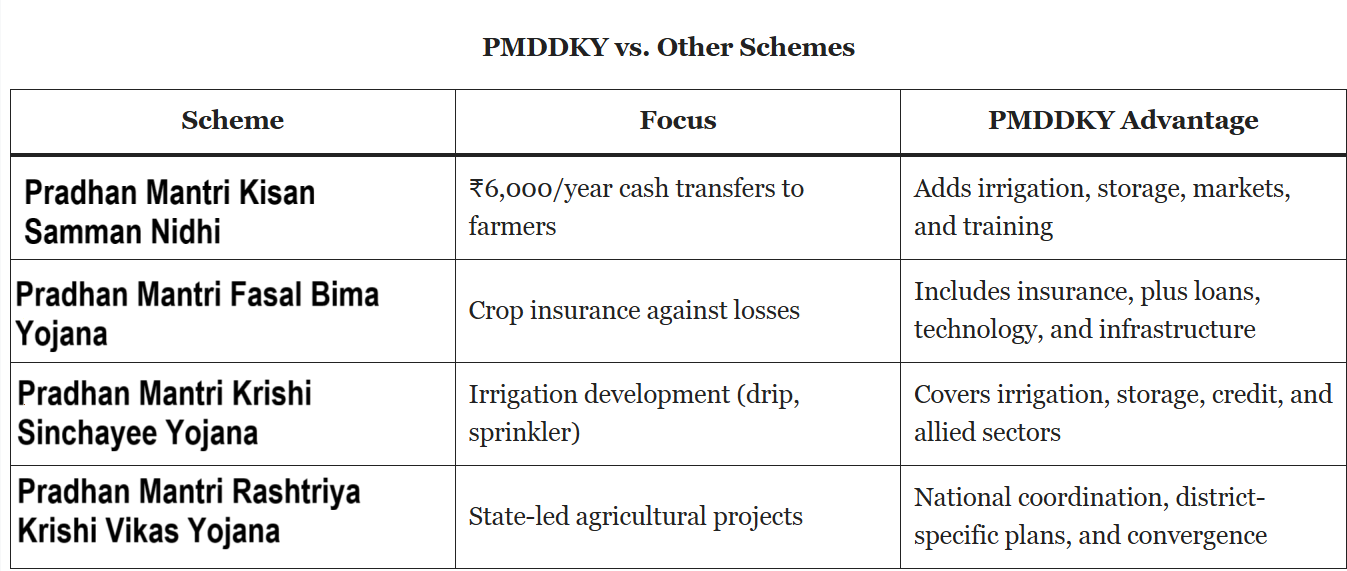Prime Minister Dhan-Dhaanya Krishi Yojana (PMDDKY) | 06 Oct 2025
Why in News?
The Centre has announced 100 Aspirational Agriculture Districts under the Prime Minister Dhan-Dhaanya Krishi Yojana (PMDDKY), aiming to boost farm productivity and rural prosperity.
What is the Prime Minister Dhan-Dhaanya Krishi Yojana (PMDDKY)?
- About: The PMDDKY announced in the Union Budget 2025 to make farming easier, modern, and more profitable.
- It is modeled after the NITI Aayog’s Aspirational Districts Programme (ADP), but focused exclusively on agriculture and allied sectors.
- PMDDKY has no separate budgetary allocation, it converges budgets of 36 existing schemes from 11 departments, including Pradhan Mantri Kisan Samman Nidhi (cash transfers), Pradhan Mantri Fasal Bima Yojana (crop insurance), and Pradhan Mantri Krishi Sinchayee Yojna (irrigation) with an annual outlay of Rs 24,000 crore from 2025-26 to 2030-31, totaling Rs 1.44 lakh crore.
- Around 40% is earmarked for subsidies, 30% for infrastructure, 20% for loans, and 10% for training and market support.
- Key Objectives of the Scheme: Enhancing agricultural productivity and farmer income.
- Promoting crop diversification and sustainable farming practices.
- Expanding post-harvest storage and value addition.
- Support women, youth, and allied sectors (e.g., dairy, fisheries, poultry) to diversify income sources.
- Achieve self-sufficiency in foodgrains, pulses and oilseeds to reduce India’s dependence on imports.
- Strengthening irrigation infrastructure and improving access to both long-term and short-term agricultural credit.
- District Selection Criteria:
- Low Crop Productivity: Districts with yields below national averages (e.g., wheat below 3.5 tonnes/hectare or rice below 2.7 tonnes/hectare).
- Moderate Cropping Intensity: Districts with fewer than 1.55 crop cycles per year.
- Low Credit Access: Districts with limited penetration of bank loans or Kisan Credit Cards, often below 30% of farmers in a district.
- Geographic Representation: The selection will consider the share of Net Cropped Area and operational holdings in each state/union territory.
- A minimum of one district will be selected from each state to ensure balanced regional development.
- Implementation: PMDDKY operates under the Ministry of Agriculture and Farmers’ Welfare, each selected district will set up a District Dhan-Dhaanya Krishi Yojana (DDKY) Samiti, chaired by the District Collector, to implement the District Agriculture Development Plan (DADP).
- Coordination will involve local administrations, agriculture departments, and 100 appointed Central Nodal Officers (mostly joint secretaries) to monitor scheme performance.
- Expected Outcomes: PMDDKY is expected to directly benefit 1.7 crore farmers across India, integrating allied sectors like livestock, dairy, and fisheries.
Aspirational Districts Programme
- About: The ADP, launched in 2018, targets 112 underdeveloped districts to improve health, nutrition, education, infrastructure, and economic opportunities.
- 3Cs Framework: Built on the 3C framework, ADP promotes Cooperative as well as Competitive federalism.
- Convergence: Coordination between various central and state schemes.
- Collaboration: Involvement of district, state, and national agencies.
- Competition: Healthy competition among districts to drive development.
- Data-Driven Governance: Progress is tracked using a public platform, the Champions of Change Dashboard, which monitors 49 indicators across five areas.
- The delta ranking system measures progress against each district’s past performance, encouraging continuous improvement.
- Success Stories: Chamba (Himachal Pradesh), achieved 100% tap water coverage and full financial inclusion under PMJDY, and Andhra Pradesh, with two districts ranking in the top 10.
- ADP’s localized, inclusive governance model has gained global recognition, including praise from Singapore, as a replicable approach for empowering communities and strengthening local health systems.
Frequently Asked Questions (FAQs)
1. What is the Prime Minister Dhan-Dhaanya Krishi Yojana (PMDDKY)?
PMDDKY is a government scheme launched in 2025 to improve agricultural productivity, promote crop diversification, and integrate allied sectors in 100 selected aspirational districts.
2. How are districts selected under PMDDKY?
Districts are chosen based on low productivity, moderate cropping intensity, and limited credit access, ensuring balanced representation across all states and UTs.
3. What is the role of the District Dhan-Dhaanya Krishi Yojana (DDKY) Samiti?
The DDKY Samiti, chaired by the District Collector, implements the District Agriculture Development Plan (DADP) and coordinates with local administrations, agriculture departments, and Central Nodal Officers.
UPSC Civil Services Examination, Previous Year Question (PYQ)
Prelims
Q. Under the Kisan Credit Card scheme, short-term credit support is given to farmers for which of the following purposes? [2020]
- Working capital for maintenance of farm assets
- Purchase of combine harvesters, tractors and mini trucks
- Consumption requirements of farm households
- Post-harvest expenses
- Construction of family house and setting up of village cold storage facility
Select the correct answer using the code given below:
(a) 1, 2 and 5 only
(b) 1, 3 and 4 only
(c) 2, 3, 4 and 5 only
(d) 1, 2, 3 and 4
Ans: (b)
Mains
Q. Mention core strategies for the transformation of aspirational districts in India and explain the nature of convergence, collaboration and competition for its success (2018)
Q. Given the vulnerability of Indian agriculture to vagaries of nature, discuss the need for crop insurance and bring out the salient features of the Pradhan Mantri Fasal Bima Yojana (PMFBY). (2016)

